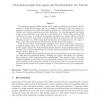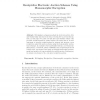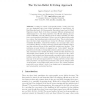136
click to vote
IACR
2011
14 years 1 months ago
2011
Abstract. Homomorphic encryption schemes are powerful cryptographic primitives that allow for a variety of applications. Consequently, a variety of proposals have been made in the ...
128
click to vote
IACR
2011
14 years 1 months ago
2011
We propose a new homomorphic encryption scheme based on the hardness of decoding under independent random noise from certain affine families of codes. Unlike in previous latticeba...
136
click to vote
CANS
2011
Springer
14 years 1 months ago
2011
Springer
In this paper, we explore fast algorithms for computing on encrypted polynomials. More specifically, we describe efficient algorithms for computing the Discrete Fourier Transform,...
132
click to vote
CCS
2010
ACM
15 years 2 months ago
2010
ACM
Secure two-party computation allows two untrusting parties to jointly compute an arbitrary function on their respective private inputs while revealing no information beyond the ou...
110
click to vote
CRYPTO
2010
Springer
15 years 3 months ago
2010
Springer
Homomorphic encryption (HE) schemes enable computing functions on encrypted data, by means of a public Eval procedure that can be applied to ciphertexts. But the evaluated ciphert...
103
click to vote
ICISC
2003
15 years 3 months ago
2003
Bid-rigging is a dangerous attack in electronic auction. Abe and Suzuki firstly introduced the idea of receipt-free to prevent this attack. In this paper we point out that Abe and...
149
click to vote
CRYPTO
2008
Springer
15 years 3 months ago
2008
Springer
In cryptography, there has been tremendous success in building various two-party protocols with small communication complexity out of homomorphic semantically-secure encryption sc...
112
click to vote
FC
2004
Springer
15 years 7 months ago
2004
Springer
Looking at current cryptographic-based e-voting protocols, one can distinguish three basic design paradigms (or approaches): (a) Mix-Networks based, (b) Homomorphic Encryption base...
116
click to vote
ACNS
2007
Springer
15 years 8 months ago
2007
Springer
Many protocols that are based on homomorphic encryption are private only if a client submits inputs from a limited range S. Conditional disclosure of secrets (CDS) helps to overcom...
114
click to vote
FC
2009
Springer
15 years 8 months ago
2009
Springer
We present a cryptographic protocol for conducting efficient, provably correct and secrecy-preserving combinatorial clock-proxy auctions. The “clock phase” functions as a trust...







